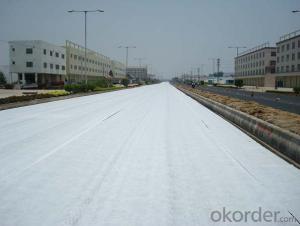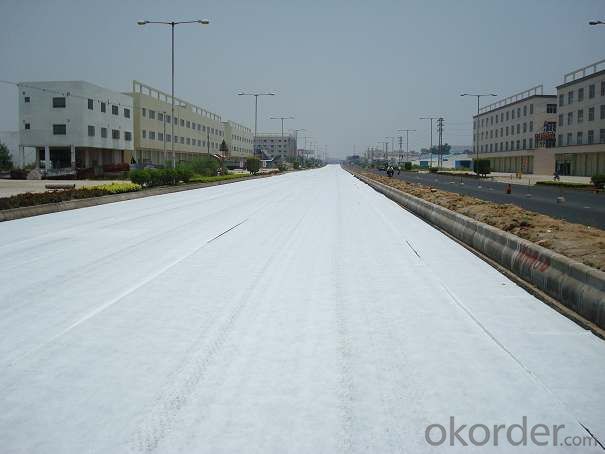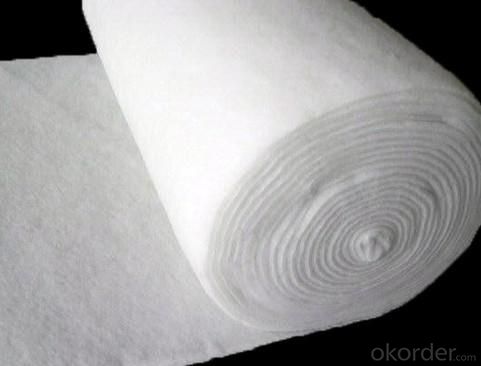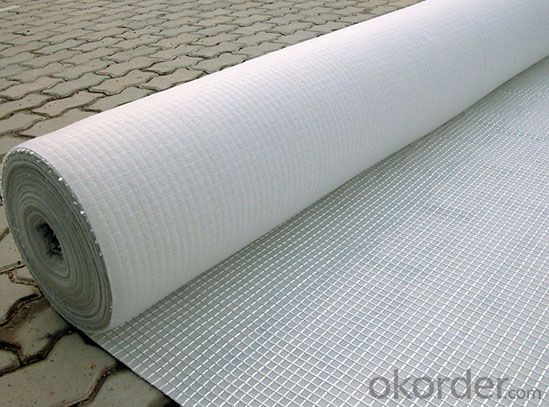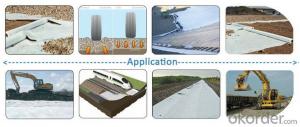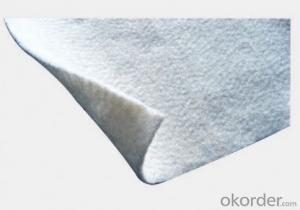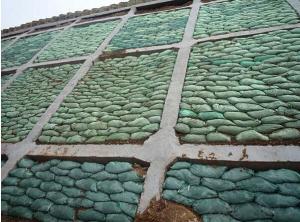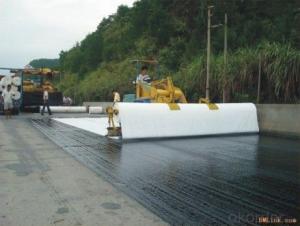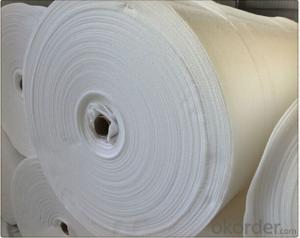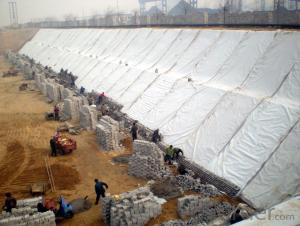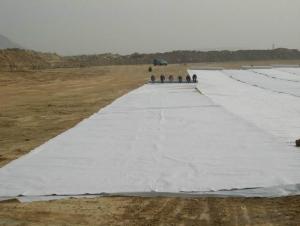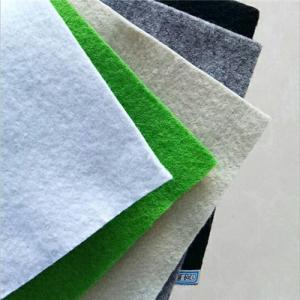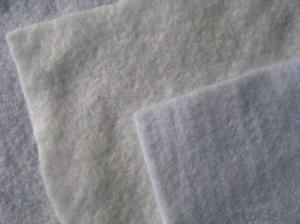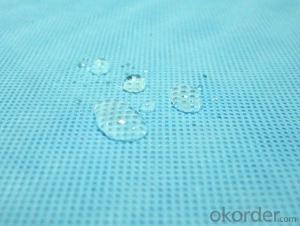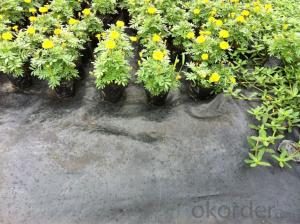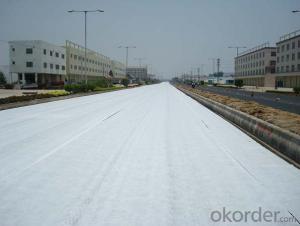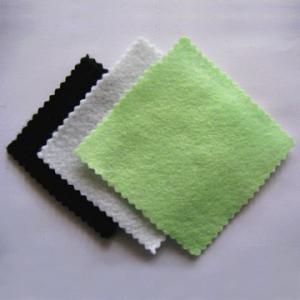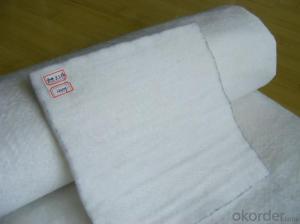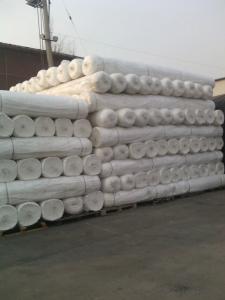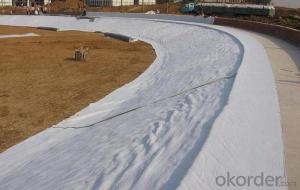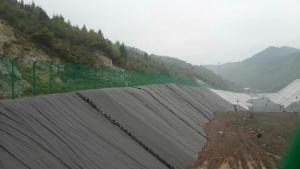Polypropylene Polyester PP/PET Non Wovens Short Fiber Geotextile Fabric
- Loading Port:
- Qingdao
- Payment Terms:
- TT or L/C
- Min Order Qty:
- 10000 m²
- Supply Capability:
- 100000 m²/month
OKorder Service Pledge
OKorder Financial Service
You Might Also Like
Woven Geotextie Specification :
No. | Item | 20-15 | 30-20 | 40-28 | 50-35 | 60-42 | 80-56 | 100-70 | |||
1 | MD Breaking Strength KN/M≥ | 20 | 30 | 40 | 50 | 60 | 80 | 100 | |||
2 | CD Breaking Strength KN/M≥ | 15 | 20 | 28 | 35 | 42 | 56 | 70 | |||
3 | Elongation Rate % | 25 | |||||||||
4 | Trapezoidal Tearing Strength KN ≥ | 0.2 | 0.27 | 0.334 | 0.41 | 0.48 | 0.6 | 0.72 | |||
5 | CBR Burst Strength KN | 1.6 | 2.4 | 3.2 | 4.0 | 4.8 | 6.0 | 7.5 | |||
6 | Vertical Permeability Coefficient cm/s | 10-1 ~ 10-4 | |||||||||
7 | Sieve size O90(O95) mm | 0.07~0.5 | |||||||||
8 | Unit Weight g/m2 | 120 | 160 | 200 | 240 | 280 | 340 | 400 | |||
9 | Variation % | ±10 | |||||||||
Filament nonwoven geotextile :
NO. | Item | Value | ||||||||||
100 | 150 | 200 | 250 | 300 | 350 | 400 | 450 | 500 | 600 | 800 | ||
1 | Weight Variation(%) | -6 | -6 | -6 | -5 | -5 | -5 | -5 | -5 | -4 | -4 | -4 |
2 | Thickness(mm)≥ | 0.8 | 1.2 | 1.6 | 1.9 | 2.2 | 2.5 | 2.8 | 3.1 | 3.4 | 4.2 | 5.5 |
3 | Width Variation% | -0.5 | ||||||||||
4 | Breaking Strength( KN/m)≥ | 4.5 | 7.5 | 10.5 | 12.5 | 15 | 17.5 | 20.5 | 23 | 25 | 30 | 40 |
5 | Elongation at break% | 40-80 | ||||||||||
6 | CBR Mullen Burst Strength KN≥ | 0.8 | 1.4 | 1.8 | 2.2 | 2.6 | 3 | 3.5 | 4 | 4.7 | 5.5 | 7 |
7 | Sieve Size O90(mm) | 0.07-0.2 | ||||||||||
8 | Vertical Permeability Coefficient cm/s | K×(10-1-10-3),K=1.0-9.9 | ||||||||||
9 | Tearing Strength KN≥ | 0.14 | 0.2 | 0.28 | 0.35 | 0.4 | 0.49 | 0.56 | 0.6 | 0.7 | 0.8 | 1.1 |
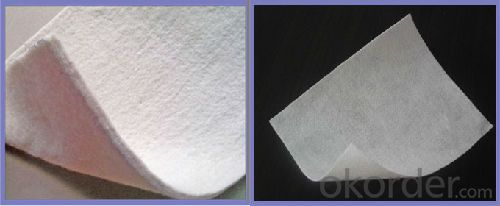

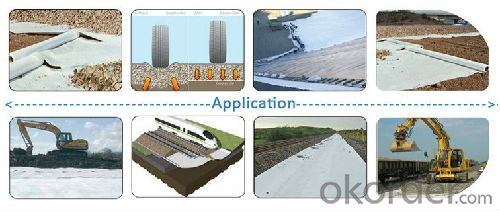
FAQ of our geotextile:
- Q: What can we do for the special customer?
A: Provide custom made service with customer's drawing; We make sure to provide you with the best solutions for your individual case. Whether standard items or non-standard items.
- Q: What can we supply?
A: We provide high levels of communication from start to finish.
- Q: What is our advantage?
A: Top Cemented Carbide has extensive business experience, Fast delivery and high quality.
As its name suggests Geotextiles refers to textiles related to earth or soil. When any permeable material used with rock, soil or earth it is termed as Geotextiles. The basic function of this technology is to prevent soil erosion to strengthening heavy concrete structures. This technology has not yet gained much attention in India, but is widely used in many countries for construction of bridges, roads, railway tracks to improve its strength. Many researchers have view that this technology is not newly developed but is in use from past thousands of years.
Formation of Geotextiles
Geotextiles can be formed of synthetic fibers, natural fibers or combination of the two. In past Geotextiles were made of natural plant fibers while today are usually formed of synthetic polymers such as polyester, polypropylene (PP), polyamides (PA) and polyamides (PA). Geotextiles made from natural fibers are less durable as they get decomposed with passage of time.
Choice of formation depends on the required properties and service life for which it is used. For example, natural fiber base Geotextiles is used for erosion control mats where durability is not a critical factor.
Natural Fiber Based Geotextiles
Natural fibers like Jute and coir have special applications. These different fibers degrade at different rates. Coir geotextiles degrade in 2 to 3 years while jute degrades in 1 to 2 years. Because of this property coir is used in situations where vegetation takes longer to establish, and jute is used in low rainfall areas as it can absorb more moisture. Also used for rural unpaved roads.
Advantages
1. Natural fiber-based geotextiles are environmental friendly.
2. Its biodegradable nature has certain cost-effective applications in erosion control and re-vegetation.
3. It is helpful in quick establishment of vegetation.
4. It also helps in dust control, sand dune formation, wind erosion control and stabilization.
- Q: 300g / m2 geotextile package is what it means
- 300g / m2 Geotextile: refers to the weight of 300g per square meter (model) 300g / m2 geotextile package: refers to the outsourcing; with 300g of geotextile to wrap something; for example: With 300g / m2 geotextile wrapped gravel. The
- Q: Can geotextiles be used in erosion control in agricultural fields?
- Yes, geotextiles can be used effectively in erosion control in agricultural fields. Geotextiles act as a physical barrier that prevents soil erosion by stabilizing the soil and reducing the impact of water flow. They can be used to reinforce slopes, control sedimentation, and provide long-term soil stabilization. Additionally, geotextiles are permeable, allowing water to pass through while retaining soil particles, making them an ideal solution for erosion control in agricultural fields.
- Q: What are the key considerations for geotextile installation in cold climates?
- There are several key considerations for geotextile installation in cold climates. First, it is important to choose a geotextile material that is specifically designed for cold weather conditions. This ensures that the material will not become brittle or easily damaged in freezing temperatures. Additionally, proper site preparation is crucial, including removing snow and ice from the installation area to ensure a stable base for the geotextile. It is also important to properly anchor the geotextile to prevent shifting or movement due to freeze-thaw cycles. Overall, careful selection of materials and proper installation techniques are essential for successful geotextile installation in cold climates.
- Q: How do geotextiles help in vegetation establishment?
- Geotextiles help in vegetation establishment by providing a stable and favorable environment for plant growth. They help to retain moisture in the soil, prevent erosion, and control weed growth. Additionally, geotextiles also protect the roots of plants from external damage and provide thermal insulation.
- Q: It is best to take a picture
- Paved on the line, lap welding or with glue. The company specializes in producing geothermal geotextile, detailed advice, please see my information
- Q: What are the specifications for geotextiles in erosion control projects?
- The specifications for geotextiles in erosion control projects typically include the material type, weight, thickness, permeability, and tensile strength. Additionally, the specifications may outline requirements for installation methods, durability, UV resistance, and longevity. These specifications are crucial to ensure that geotextiles effectively mitigate erosion and provide long-lasting erosion control solutions.
- Q: How do geotextiles interact with other geosynthetic materials?
- Geotextiles interact with other geosynthetic materials by complementing their functions and enhancing their performance. They can be used in conjunction with geogrids, geomembranes, or geocomposites to provide additional reinforcement, filtration, separation, or drainage capabilities. Geotextiles can be layered between different geosynthetic materials to create a composite system that addresses multiple engineering requirements in various civil and environmental applications.
- Q: What are the specifications for geotextiles in stormwater management projects?
- The specifications for geotextiles in stormwater management projects vary depending on the specific requirements of the project. However, some common specifications include the type and thickness of the geotextile, its permeability, tensile strength, and durability. Additionally, the specifications may also outline the installation methods and quality control measures to be followed during the project.
- Q: What is the role of geotextiles in geotechnical engineering?
- Geotextiles play a crucial role in geotechnical engineering as they are used to enhance soil stability, reinforce slopes, and improve drainage systems. These permeable fabrics help prevent soil erosion, control sediment movement, and distribute loads efficiently. Additionally, geotextiles can be employed in various construction projects, such as roadways, embankments, and retaining walls, to provide strength and durability to the soil structure.
- Q: Geotextile 100 meters a roll is about how much diameter
- Look at the pressure roll it pressure in the 20-40 cm I was the manufacturer
1. Manufacturer Overview
| Location | Taian City,Shandong Province,China |
| Year Established | 2008 |
| Annual Output Value | Above US$100 Million |
| Main Markets | Africa, Oceania, North America, Western Europe, Eastern Asia |
| Company Certifications | ISO9001;IS014001 Certificate |
2. Manufacturer Certificates
| a) Certification Name | |
| Range | |
| Reference | |
| Validity Period |
3. Manufacturer Capability
| a) Trade Capacity | |
| Nearest Port | Qingdao Port;Tianjing Port;Shanghai Port |
| Export Percentage | |
| No.of Employees in Trade Department | 21-30 People |
| Language Spoken: | English; Chinese; |
| b) Factory Information | |
| Factory Size: | 10,000-30,000 square meters |
| No. of Production Lines | Above 10 |
| Contract Manufacturing | Geotechnical Material (Geogrid,Fiberglass/Polyester Geogrid,Geocell,Geonet and Geomat,Plastic Safety Fence) |
| Product Price Range | Average |
Send your message to us
Polypropylene Polyester PP/PET Non Wovens Short Fiber Geotextile Fabric
- Loading Port:
- Qingdao
- Payment Terms:
- TT or L/C
- Min Order Qty:
- 10000 m²
- Supply Capability:
- 100000 m²/month
OKorder Service Pledge
OKorder Financial Service
Similar products
Hot products
Hot Searches
Related keywords
